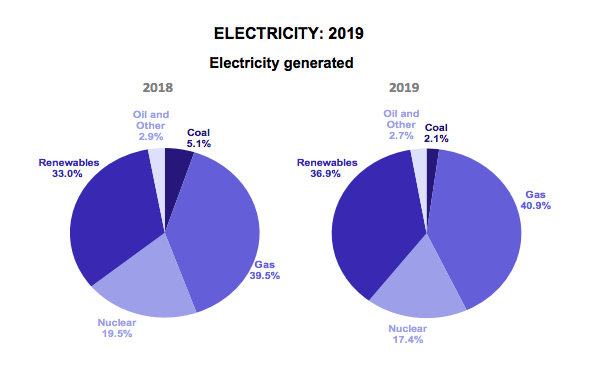Renewable power generation of 119 TWh set new records in the UK last year, accounting for 37 per cent of electricity, up 4 percentage points on 2018.
The output, detailed in the latest government figures, contributed to the nation’s homegrown carbon emissions dropping 3.6 per cent from 2018.

Overall national electricity production was 323.7 TWh, a drop of 2.8 per cent against 2018. Generating capacity across all renewable technologies rose 7 percent and the sector’s output rose 8 per cent.
Wind power led the charge. Total capacity now at 24GW, up 1.6GW, provided 64TWh of output, or almost a fifth of all the nation’s electricity. Capacity increases were largely driven by extensions to Orsted’s Hornsea One project.
Bioenergy rose 5 per cent, yielding 36.6 TWh. Hydro production advanced 8 per cent to 6.0 TWh.
Solar PV outputted dipped 1.4 per cent versus record sunny skies in 2018. Its 12.7 TWh of generation came from 13.6GW of installed capacity.
Coal’s retreat continued, dropping from 5.1 per cent of the overall generation mix in 2018 to 2.1 per cent in 2019.
Nuclear outages curtailed output, down from 19.5 to 17.5 per cent.
Gas picked up some of the slack, increasing from 39.5 per cent in 2018 to 40.9 per cent in 2019.
More details here
Related stories:
Iain Conn: We will use a lot more gas before we use less
National Grid: We need 65,000 renewables engineers and data analysts
National Grid: To hit net zero we need immediate action, and to stop picking winners
Grid chief: Inertia has been “taken for granted, it will become much more important”
Follow us at @EnergystMedia. For regular bulletins, sign up for the free newsletter.




Electricity related carbon emissions dropped by3.6% last year. Of which 2.8%. came as a result of lower consumption.
So shouldn’t your headline more accurately read: “Energy saving delivers over three-quarters of last year’s carbon reduction?” Or are you still only interested in energy supply sources?